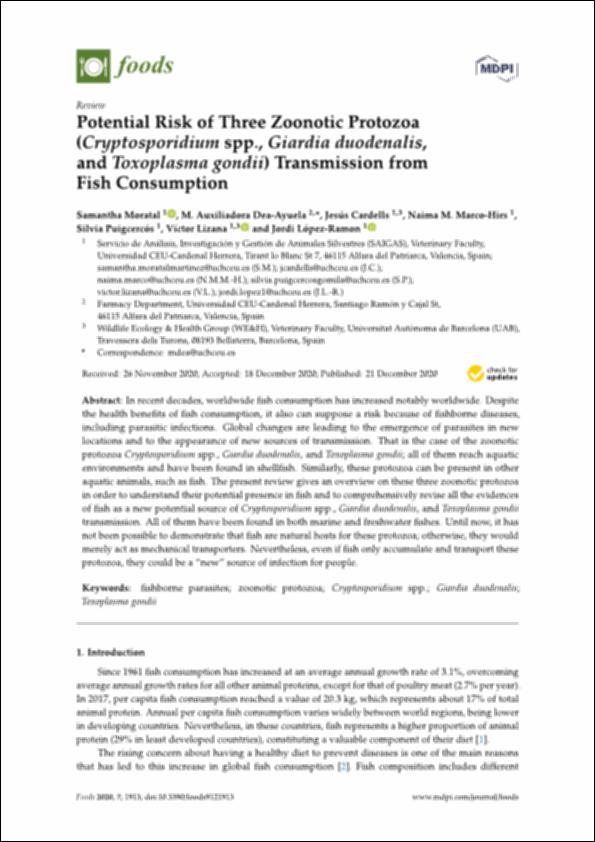Por favor, use este identificador para citar o enlazar este ítem:
http://hdl.handle.net/10637/12675Potential risk of three zoonotic protozoa (Cryptosporidium spp., Giardia duodenalis, and Toxoplasma gondii) transmission from fish consumption
| Título : | Potential risk of three zoonotic protozoa (Cryptosporidium spp., Giardia duodenalis, and Toxoplasma gondii) transmission from fish consumption |
| Autor : | Moratal, Samantha Dea Ayuela, María Auxiliadora Cardells Peris, Jesús Marco Hirs, Naima M. Puigcercós Gomila, Silvia Lizana Martín, Víctor Manuel López Ramon, Jordi |
| Materias: | Zoonosis.; Cryptosporidium spp.; Protozoos.; Protozoa.; Toxoplasma gondii.; Zoonoses.; Fishes - Parasites.; Giardia lamblia.; Peces - Parásitos. |
| Editorial : | MDPI |
| Citación : | Moratal, S., Dea-Ayuela, M.A., Cardells, J., Marco-Hirs, N.M., Puigcercós, S., Lizana, V. et al. (2020). Potential risk of three zoonotic protozoa (Cryptosporidium spp., Giardia duodenalis, and Toxoplasma gondii) transmission from fish consumption. Foods, 9, i. 12 (21 dec.), art. 1913. DOI: https://doi.org/10.3390/foods9121913 |
| Resumen : | In recent decades, worldwide fish consumption has increased notably worldwide. Despite the health benefits of fish consumption, it also can suppose a risk because of fishborne diseases, including parasitic infections. Global changes are leading to the emergence of parasites in new locations and to the appearance of new sources of transmission. That is the case of the zoonotic protozoa Cryptosporidium spp., Giardia duodenalis, and Toxoplasma gondii; all of them reach aquatic environments and have been found in shellfish. Similarly, these protozoa can be present in other aquatic animals, such as fish. The present review gives an overview on these three zoonotic protozoa in order to understand their potential presence in fish and to comprehensively revise all the evidences of fish as a new potential source of Cryptosporidium spp., Giardia duodenalis, and Toxoplasma gondii transmission. All of them have been found in both marine and freshwater fishes. Until now, it has not been possible to demonstrate that fish are natural hosts for these protozoa; otherwise, they would merely act as mechanical transporters. Nevertheless, even if fish only accumulate and transport these protozoa, they could be a “new” source of infection for people. |
| Descripción : | Este artículo se encuentra disponible en la siguiente URL: https://www.mdpi.com/2304-8158/9/12/1913 Este artículo pertenece al número especial "Reviews on food microbiology, foodborne pathogens, and probiotics". |
| URI : | http://hdl.handle.net/10637/12675 |
| Derechos: | http://creativecommons.org/licenses/by/4.0/deed.es |
| ISSN : | 2304-8158 (Electrónico). |
| Fecha de publicación : | 21-dic-2020 |
| Centro : | Universidad Cardenal Herrera-CEU |
| Aparece en las colecciones: | Dpto. Producción y Sanidad Animal, Salud Pública Veterinaria y Ciencia y Tecnología de los Alimentos |
Los ítems de DSpace están protegidos por copyright, con todos los derechos reservados, a menos que se indique lo contrario.


